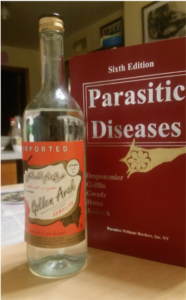 The doctors of awesome solve the case of the Woman Who Visited Lebanon, and reveal that immunoglobulins protect the olfactory organ of trout against infection with the Ich parasite.
The doctors of awesome solve the case of the Woman Who Visited Lebanon, and reveal that immunoglobulins protect the olfactory organ of trout against infection with the Ich parasite.
Hosts: Vincent Racaniello, Dickson Despommier, and Daniel Griffin
Click arrow to play
Download TWiP #163 (64 MB .mp3, 105 minutes)
Subscribe (free): iTunes, Google Podcasts, RSS, email
Become a patron of TWiP.
Links for this episode:
- Mucosal Ig protect trout from Ich (PLoS Path)
- Hero: Sir Patrick Manson
- Letters read on TWiP 163
Case Study for TWiP 163
From here in US before leaving for Uganda: male has lesion affecting nose. Has been having problem with nose for 2 yr, in 40s, surfer, hit nose with board. Southern eastern Costa Rica. After that had blood and scabs from nose. Inside of nares, scab formed. Did not improve with time. Saw ENT doc on LI, said he hit nose and needs reconstructive surgery. Entire septum destroyed. 20+ years ago had non healing ulcer on left hand, saw physician in CR, was treated for 20 days.
Send your case diagnosis, questions and comments to twip@microbe.tv
Music by Ronald Jenkees


I have a parasite that is able to b a mite or parasite. No microscope has isolated it. It’s inside and when i took meb and pa pills they attacked the skin as both worms and mites gave me mange-scabies they come out eyes as flies and nose as clear worms out ears and belly button as large worm baby and out pores as black eggs and larvae that roll across skin. If u r real please help me. I can’t get drs to help coz they r so very ignorant to facts and keep relying on microscope that cannot see the parasites. Shane smith is name please help by contacting my email at shanesmith1399@gmail.com.
Happy new year! and wishing you another great year of podcasts!
I’ll venture a guess, I THINK the patient has Leishmania braziliensis, even though the book makes no mention of Costa Rica but I can’t think of anything else with non-healing ulcers. anyway, I have a couple of questions on the case anyway:
1. May I ask Dr. Griffin, why did the patient come to YOU, by you meaning an infectious disease doctor. Didn’t he like the previous diagnosis? or was he trying to find a reason not to have surgery because he doesn’t like surgeries? I think it’s the patient sometimes who plays a role in getting the right diagnosis by choosing the right doctor! A friend of mine here in Greece had leishmaniasis but she spent more than 6 months going from doctor to doctor to hospitals and clinics. Different people said different things, the most prominent diagnosis being that of cancer. She ended up seeing an infectous disease specialist in another town (not even city, not even Athens!) after she had gotten desperate and someone had recommended the doctor to her and she was lucky! The doctor ordered the correct lab tests and she finally got her diagnosis! imagine if she had been treated for cancer instead
2. ok, so doesn’t the patient need the reconstructive surgery anyway? I think he does. Had he had the surgery, would the surgeons biopsy the material and hopefully refer him to an infectious disease specialist after the surgery? (the book says that the organisms are not detected, only PCR will show)
In any case, my overall point being: you might get misdiagnosed sometimes. So then, what? given that doctors don’t like to talk to each other. some patients will give up sooner than finding another doctor. Just my thoughts
always a pleasure listening to this podcast. Since 2011. Keep it up and stay healthy!
all the best
greetings from Thessaloniki, Greece, current temp 8 degrees Celcius (not too bad)
Greetings and Happy New Year Gentlemen,
I’m an oldie-but-goodie and love all the sciences. I never had the need for a smart phone but recently gave in to peer pressure and got myself one (now they make fun of me b/c I got a “phablet” which is a combo of phone and tablet as I knew I would use the tablet features more than the phone and it has a 6.6″ screen so I can see it without my glasses. So big! but it still fits in my pocket). One reason I gave in was the need to download MP3 files–I am an avid audio listener and was getting very tired of my MP3 players frequently breaking–I listen almost constantly.. The advantage here is the apps allowing me to listen to an unending number of podcasts at no charge. I had been listening almost exclusively to a service that charged and has a limited number of scientific audio books. Your podcasts were among the first I discovered and I am having a wonderful time learning so much while at the same time saving money!
I’m an ER nurse in and inner-city hospital with fairly large Vietnamese and Cambodian populations as well as Hispanic and your discussions are helping to make me more aware of what might be walking in our doors. For example, when i triage patients I no longer ask if they have been out of the country, I now ask if they have been out of the area at all and include such information in my triage note.
As I said, I have only been listening to your podcasts for a short while and am listening chronologically so I have a long way to go before I catch up:. However, I have a question about hookworm that hasn’t been answered up to the point I have reached. I recently adopted a greyhound from Fla and at present the dogs coming out of the Fla racetracks are infested with hookworms. She is being treated and is quite healthy but it is a prolonged treatment that will last months. My question is: you mentioned in your hookworm podcast that they are not a problem in the northeast due to temps and soil. You did not mention how low a temp the worms can tolerate and this winter seems to be shaping up to be similar to, or even milder than, last winter in the northeast and since I live in NJ I have concerns that it will not get cold enough to kill any eggs (the meds cause diarrhea so it is difficult to clean up all the stool especially if it doesn’t have a chance to freeze). The ground has not frozen since I got the dog and if her infestation persists the weather will turn warmer while she is still being treated and I will have to contend with that as well. As for the soil type my property was once a horse farm and I am an avid gardener so the soil is good quality garden soil that is well aerated by constantly digging dogs.
I have searched the internet and even queried vet sites and my own vet and no one knows the answer so I am now turning to you. I’m happy to receive your answer via my e-mail rather than waiting for you to reply on you podcast but with the upcoming exodus of greyhounds that will be coming out of Fla over the next couple years now that racing has been outlawed in that state I’m sure I’m not the only one wondering about this. I will be passing the info on to the adoption agency, which is associated with a rather large kennel in the area, as they have expressed an interest as well.
Thanks for your help and keep on saving me money with your terrific podcasts.
P.S. Suggested pick of the week: “Why We Sleep” by Matthew Walker. A very well written and well researched book on the importance of sleep and how it affects all aspects of our lives.